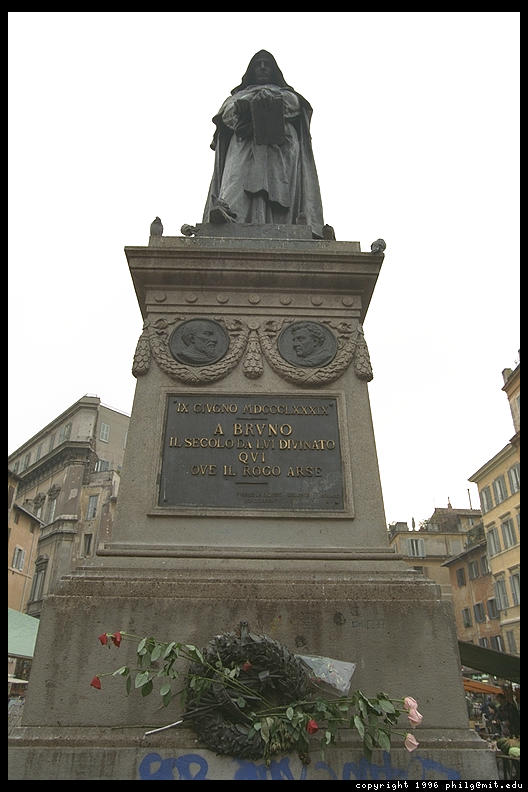
 |
Freethought & Rationalism ArchiveThe archives are read only. |
|
|
#311 |
|
Regular Member
Join Date: Jul 2004
Location: Romania
Posts: 453
|
Buridan, don't even try to argue with spin, pigheaded arguments are classics from him. Just tell me which passages in Italian you want translated and I will try to help you.
|
|
|
|
|
#312 |
|
Contributor
Join Date: Mar 2002
Location: nowhere
Posts: 15,747
|
Post 279 of this thread. The passage that starts "io tengo un infinito universo". Note that the final accented /a/ is represented by a "?*".
And for you: 
|
|
|
|
|
#313 | |
|
Junior Member
Join Date: Oct 2005
Location: Australia
Posts: 19
|
Quote:
It was the rise of protestantism and the Catholics own politicizing that got Gallileo, they'd never had issues with science proving details like universe or earth models from abstract bible verses wrong. They had no issue with the world being round (despite the myth purported by Washington Irving) either, as they were already using celestian navigation at the time, which of course doesn't work on a flat world. What happened with Gallileo is the Catholic church sort of sat back, the reformists like Luther started to make a song and a jump about it, and the Catholics fearing more converts turned political and forced him to withdraw his claims. From then on, and for quite some time a lot of the issues with science/philosophers was political concerns on the Catholics side vs the literalist reformers, understandable since churches are there for their own power, right? Go 100 years into the future and the debates had settled down, and the catholic/protestant world had pretty much finalised itself, and you had Kepler and Copernicus, Kepler being in Lutheran territory and Copernicus in Catholic, whilst the Catholic church stayed silent on Copernicus' work, the Lutherans excommunicated Kepler for his work, it was really the rise of the literal-if-I-translate-it-that-way reformists that made the church seem antagonistic towards science, before the reformation, they'd generally just sat back and let scientists go on their merry way provided they didn't outwardly support some distinct heretical view, like unitarianism or judaism. |
|
|
|
|
|
#314 | |
|
Junior Member
Join Date: Aug 2004
Location: Europe
Posts: 55
|
Quote:
And for your willingness to translate. Take the time you need, I am in no hurry here. Ciao:Cheeky: |
|
|
|
|
|
#315 | |||||||||||
|
Veteran Member
Join Date: Mar 2004
Location: Transylvania (a real place in Romania ) and France
Posts: 2,914
|
Quote:
 Above is his 'scientific, reasonable and original' idea rooted in Plato (another Greek), that of inserting the five Platonic solids in the spaces between the Celestial Spheres. Here are the five Platonic solids which Kepler tryied to use in order to explain the movement of the six known planets. The perfect Pythagorean or Platonic solids would account for the irregular motion of the planets.  Quote:
Quote:
Quote:
Quote:
contribution to his view. Quote:
Quote:
Brache's very good observation in equations, but based on metaphysical reasons. Quote:
He was an advocate of Astrology, pythagorean harmony between his laws. Someone who holds such ideas can hardly be called 'reasonable'. And what he did can hardly be called Science: he was trying for 20 years to fit Tycho's observations into equations. He had the data and through a process of trial and error, he managed to formulate his famous Laws. He brought no explanation about its mechanism, he made no experiment. Actually, the explanation was more metaphyical and theological than scientific. But his discovery strenghtened the position of the Copernican system and gave Newton the possibility to develop his theory of universal attraction. On the other hand, Bruno too defended the Copernican system: his book Cena de la Cerneri - The Ash Supper, is describing his public debate and defense of the Copernican system. He attacked the ideas of Aristotle, which were held dogmatically in that age as an Absolute truth (a thing which Copernicus or Galileo also did, directly or indirectly).Bruno's thinking attacks directly the biblical geocentric view of those ages. He advocates for an infinite universe, but most important, for the fact that there is no reason to believe that there is a difference between the aristotelic sublunar and supralunar spaces, that it is the same substance everywhere, without any privilege for the one on our world. He de-centralized the view of Scholasticism. An idea kept to this day: the universe has no center, and there is no privileged point from where to start going. But, the difference between the two is that Kepler lived in Germany, and was outside the reach of the arm of the Roman Inquisition. Kepler's book also arrived on the Index of Forbidden Books. Quote:
Quote:
Quote:
|
|||||||||||
|
|
|
|
#316 | |
|
Junior Member
Join Date: Oct 2005
Location: Australia
Posts: 19
|
Meh, I get the names Copernicus and Gallileo mixed up timeframe from time to time like my above post.
Quote:
The catholic church never issued any official position for or against Gallileo, this is considered and quite plausibly be because the Pope at the time was his friend and kept the church from stating any official position which of course didn't stop clergy from making a song and a dance, but after all, he was the Pope. Kepler on the other hand, was a deeply religious man, far moreso than Gallileo and was excommunicated as a heretic for his views (you know, eternal damnation and all that) and was always deeply troubled by this. The Catholic Church may have been over politicized and corrupt, Martin Luther fell into the same trap (you know, how he denied the scriptural truth of the trinity, then later denied it for political reasons?) and died what he had attempted to break the shackles of, whilst Zwingli was a monster, and Calvin, if there was ever an anti christ, John Calvin was that man. Kepler wasn't protected by being in Germany, he suffered because of it, he would have been better served to be under the more liberal Pope that was in Rome at the time, than under the auspices of the Augsburg Synod. As for the reformists and Copernicus, would you like me to quite Luther's comments about Copernicus and what happened to the people within Luther's region when he pronounced them heretics? how about early Baptists who only found respite in Russia or ironically due to the invasion of Transylvania by Suleiman the Magnificent? The muslim who saved the unitarian christians from the reformists, yeah....the reformists really weren't like Rome at all... It was the irony of it all, somehow the Spanish inquisition, a secular inquisition performed at the condemnation of the Pope managed to be worse than any religion inquisition, combined with the fact that the reformers, somehow, managed to actually be worse than the Catholics. Just when one would have thought that nothing could be more corrupt or brutal than the Catholic Church, they jumped up and proved us wrong :rolling: |
|
|
|
|
|
#317 | |||||||
|
Veteran Member
Join Date: Mar 2004
Location: Transylvania (a real place in Romania ) and France
Posts: 2,914
|
Quote:
Check what Pope Urban VIII, his friend decreed: Quote:
Quote:
Quote:
Quote:
In the very liberal atmosphere that dominated Italy, Galileo was condemned for teaching Copernicanism, his book and Copernicus' book arived on the Index Librorum Prohibitorum, Bruno was burned at stake in 1600. The only thing that kept Kepler safe while being a suporter of Copernicanism was that he was out of the jurisdiction of the Roman Inquisition, in Germany. Quote:
Quote:
|
|||||||
|
|
|
|
#318 | |||
|
Veteran Member
Join Date: Jun 2004
Location: none
Posts: 9,879
|
Quote:
Quote:
Quote:

|
|||
|
|
|
|
#319 | |||||||||||
|
Regular Member
Join Date: Jul 2004
Location: Romania
Posts: 453
|
Bobinus, cut the strawmen assault and stop bringing shallow googled arguments. How is any of your objections showing that an ellipse was a Greek concept? How was I claiming that everything Kepler held was not Greek? Address the arguments being made if you ever try to make a point.
Show me the Greek heritage of Kepler's laws and you'll make a point. Otherwise you'll have to hide behind spin's shadow as he made the same arguments and I refused to address them because the strawman I just mentioned. You had this chance because it's your first reply here. Don't waste it  Quote:
Quote:
Quote:
Quote:
Quote:
Quote:
Quote:
To set a claim in discovering mechanism x is not science but wishful thinking. An astronomer could not discover gravity without commiting a fallacy. Gravity could be discovered only here on Earth. Which happened. Quote:
The value of Kepler is not that only supported Copernican view, but that he supported it with evidence. Bruno just wove his literary style around it. As for the infinite universe and for the lack of center, Bruno provided it because his theological view forces him to do so. His view is not his own, but Cusanus' and other dudes' as I previously shown in this thread. He did not decentralized Scholasticism because it was already obsolete. Your knowledge gaps in the history of thought are not an excuse. Quote:
Quote:
Quote:
<edit> Be prepared next time. |
|||||||||||
|
|
|
|
#320 | |||
|
Junior Member
Join Date: Oct 2005
Location: Australia
Posts: 19
|
Quote:
Urban had been a close friend of Gallielo, he knew what he'd been writing for years after the Bellamine cease and desist and never did anything, along 17 years later and the book was published, they put on what was not much more than a political save face trial, a byroduct of the entire Reformation/Counter reformation crap that plagued Europe for years, which at the end he issued a recant which he never really stuck too and was placed under house arrest (yeah, the blind old man was banished to be stuck in and around his house of Florence even though he had said he was becoming too ill to go anywhere) and continued to study and teach, but not produce books (he was blind....) He was never going to be executed, had he refused to recant, the worst they would have done to him was excommunicate and house arrest him permanently, excommunication was as big a deal as anything though, his case wasn't even remotely similar to Bruno's, who denied some of the most basic core tenets of the religion. Had either Gallileo or Kepler pronounced disbelief towards the trinity and such, they too would have gotten executed, Kepler though was excommunicated (technically, though they didn't use the word, but it was in the same effect) long before by the Lutherans for refusal to accept the Augsburg Synod, and since he kept to himself, never said anything about religion and he wasn't officially part of their religion anymore anyway, they just looked the other way. As for his refusal to go to Catholic territory, it probably had more to do with him being raised Lutheran and the counter reformation, which had precisely dick to do with science anyway. He could have been nothing more than a peasant farmer and he wouldn't wanted to have been in catholic country, it wasn't exactly safe in the german heartland of Lutheranists to be a Catholic either. Quote:
Quote:
It's the in thing to bash the Catholics for anything and everything, sure they were and still are a corrupt organisation, but they weren't anywhere near as bad, nor alone while the "Reformists saved the world". The reformists out of Germany, Austria, Switzerland, or England were as bad and worse at times, in some see-saw back and forth game of "Who wants to screw humanity". And what was even worse was when the secular authorities took control of previously religious injustices, and turned them into something far worse, the spanish inquisition being a prime example. The only thing worse than religion with secular authority, is the secular with religious authority. |
|||
|
|
| Thread Tools | Search this Thread |
|